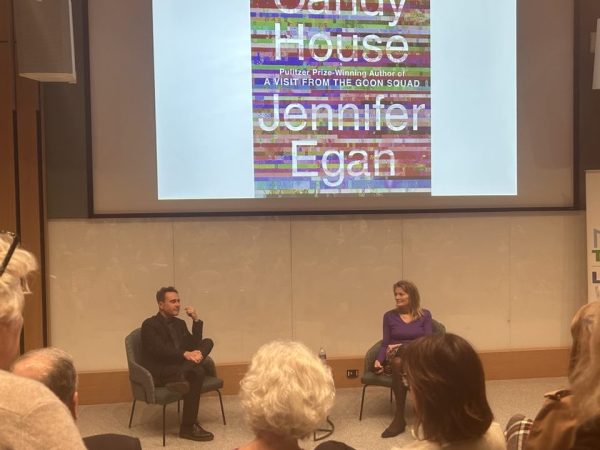
On Wednesday, Nov. 15, author and Pulitzer Prize-winner Jennifer Egan visited Tulane University as a part of the Carole Barnette Boudreaux ‘65 Great Writers Series. The series is supported by an endowment established in 2018 by Tulane graduate Carole Boudreaux and her husband Kenneth Boudreaux.
Egan is a 2011 Pulitzer Prize-winner and the author of several fiction books and long-form The New York Times articles. Egan’s crowd consisted of a balanced mix of students and retirement-age folk who eagerly took notes in backs of their copies of “The Candy House” and “A Visit From the Goon Squad,” which Egan signed after the talk.
Fellow author and associate professor of English, Thomas Beller, introduced Egan. Egan sat at the end of the aisle, laughing at the anecdotes Beller shared before finally coming up to the podium to give her highly anticipated talk about her views on fiction, her creative process and the broader role of fiction in our culture.
Egan began by speaking about her writing process, which she largely bases on her dreams and unconscious mind. She states that dreams transform our everyday lives into works of art “that are packed with suspense and symbolism, mystery and meaning.” She compares fiction to the collective dream of our culture: a transformation of our everyday lives into something much more exciting.
Her entire writing method is geared towards unlocking her unconscious mind, which she does by handwriting every piece of fiction with no outline or idea of where the story will go and not reading what she has written until the next day. She describes this as “an intentional state of blindness.”
Although she takes much inspiration from her everyday life as a mother of two, she never uses real people or situations from her life. Instead, she transforms these seemingly mundane occurrences into something much more interesting. Egan read the audience a version of the “Three Little Pigs” that she often read to her two sons when they were young, in which the pigs leave their own story and jump from fairy tale to fairy tale, the artistic style of the illustrated pigs changing as they move from different stories. Egan used the idea of a character changing forms from one genre to another to write a chapter about one of her characters working as a spy in her book, “The Candy House.”
Egan also spoke about the value of list making in her creative process and the ability for lists to act as a journal of her domestic and creative life.
“What interests me about lists is that obviously they serve a practical purpose. I would be completely lost without them. But they also have an unintentional narrative quality … I think of it as inadvertent storytelling,” said Egan.
English professor and novelist Zachary Lazar led a question and answer session before a few questions were fielded from the audience. Egan concluded by briefly discussing her other roles as a professor of literature at the University of Pennsylvania and a journalist for The New York Times. She spoke about how enriched her life and writing have become being able to delve into other people’s lives as a journalist, despite the difference in journalistic and novel writing.
Egan is a lively person and creative writer. Her talents transcend fiction writing into the realms of teaching and journalism, and she left the audience of aspiring writers and creators of all sorts with one piece of advice for finding the value in one’s work.
“Ask,” she said, ‘Where is it alive?’”


